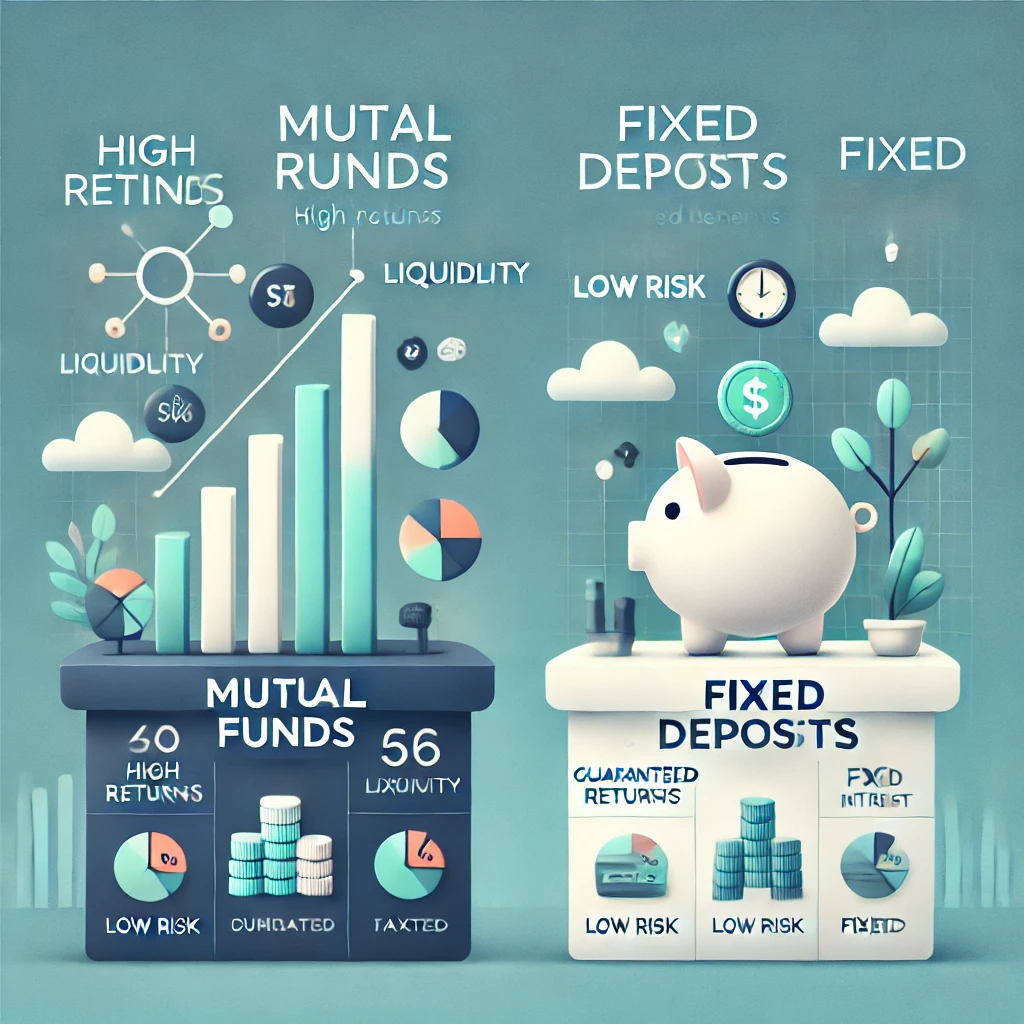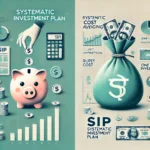When it comes to choosing between mutual funds and fixed deposits (FDs) in 2025, investors face a common dilemma. Both investment options have their unique benefits, but they cater to different financial goals and risk appetites. In this blog, we will compare mutual funds and fixed deposits based on returns, liquidity, and tax efficiency to help you make an informed decision.
1. Understanding the Basics
Mutual Funds
- A mutual fund pools money from multiple investors to invest in diversified financial instruments like stocks, bonds, or money market securities.
- Types of mutual funds include equity funds, debt funds, and hybrid funds.
- Returns are market-linked and can vary based on market conditions.
Fixed Deposits (FDs)
- FDs are time-bound deposit schemes offered by banks and financial institutions.
- They offer fixed returns over a predetermined tenure, making them a low-risk investment option.
- Interest rates are predetermined, and there’s no exposure to market fluctuations.
2. Comparison of Mutual Funds and FDs
| Feature | Mutual Funds | Fixed Deposits (FDs) |
|---|---|---|
| Returns | Market-linked, potentially higher (8%-12% for equity, 5%-7% for debt funds). | Fixed returns (5%-8%, depending on tenure and bank). |
| Risk | Moderate to high (depends on fund type). | Low risk. |
| Liquidity | Highly liquid; redeemable anytime (may incur exit load). | Premature withdrawal allowed but with penalties. |
| Tax Efficiency | Tax-efficient (indexation benefits for debt funds, tax-free dividends). | Interest is fully taxable as per the investor’s income slab. |
| Investment Horizon | Best for medium to long-term goals (3-10+ years). | Suitable for short to medium-term goals (1-5 years). |
| Flexibility | Can start with as low as ₹500 through SIPs. | Requires a lump sum deposit (minimum ₹5,000 or more). |
**3. Comparison Based on Key Factors
a. Returns
- Mutual Funds:
- Equity mutual funds have the potential to deliver higher returns in the long term, often outpacing inflation.
- Debt mutual funds may offer returns comparable to FDs but with added tax benefits.
- Market conditions can lead to fluctuations in returns, so a higher risk appetite is required.
- FDs:
- Fixed returns provide certainty, making them ideal for risk-averse investors.
- However, with inflation-adjusted returns, FDs often deliver negative real returns, especially in a high-inflation environment.
Winner: Mutual Funds (higher return potential, especially for equity funds).
b. Liquidity
- Mutual Funds:
- Can be redeemed anytime, though equity funds may have a 1-year lock-in for tax-saving ELSS or exit loads.
- Liquid mutual funds offer instant liquidity within 24 hours.
- FDs:
- Premature withdrawal incurs penalties, and certain tenures may restrict withdrawal altogether.
- Not ideal for emergencies or sudden financial needs.
Winner: Mutual Funds (more flexible liquidity options).
c. Tax Efficiency
- Mutual Funds:
- Equity Funds:
- Gains are taxed at 10% for long-term capital gains (LTCG) exceeding ₹1 lakh (holding period > 1 year).
- Short-term gains are taxed at 15%.
- Debt Funds:
- LTCG (holding period > 3 years) taxed at 20% with indexation benefits, which reduces tax liability.
- Short-term gains are taxed as per the investor’s income slab.
- Equity Funds:
- FDs:
- Interest income is fully taxable according to your income tax slab (10%-30%), with no deductions or benefits.
- Tax deducted at source (TDS) applies if interest exceeds ₹40,000 per annum (₹50,000 for senior citizens).
Winner: Mutual Funds (greater tax efficiency due to indexation and LTCG benefits).
4. Who Should Choose What in 2025?
Choose Mutual Funds If:
- You are comfortable with moderate to high risk.
- You aim for inflation-beating returns over the long term.
- You need flexibility in investment amounts (SIPs) and liquidity.
- You seek tax-efficient growth.
Choose FDs If:
- You prefer low-risk, fixed returns.
- You have a short-term financial goal.
- You want a simple, no-market-fluctuation investment option.
- You are a senior citizen seeking stable returns, as banks offer higher FD rates for seniors.
5. Mutual Funds vs FDs: Verdict for 2025
In 2025, mutual funds seem to edge out FDs for most investors due to their higher return potential, liquidity, and tax efficiency. However, FDs still hold their ground for those with a low-risk appetite and short-term investment goals.
6. Final Advice
- Diversify your portfolio. Consider balancing between mutual funds and FDs based on your risk tolerance and financial goals.
- Consult a financial advisor to tailor your investments to your specific needs.
By understanding the strengths and limitations of mutual funds and FDs, you can build a strategy that aligns with your financial aspirations. So, which one will you choose in 2025—market-linked growth or fixed returns? Let us know in the comments below!



